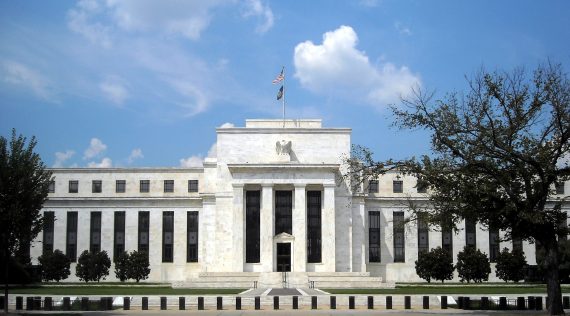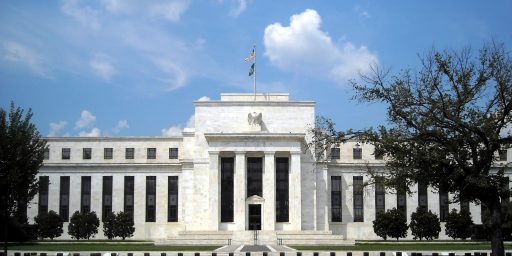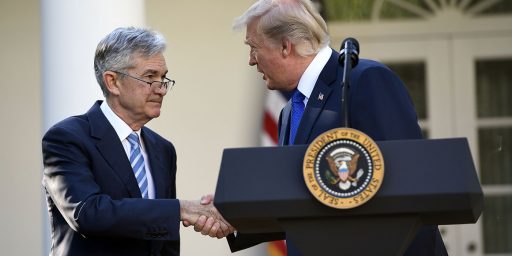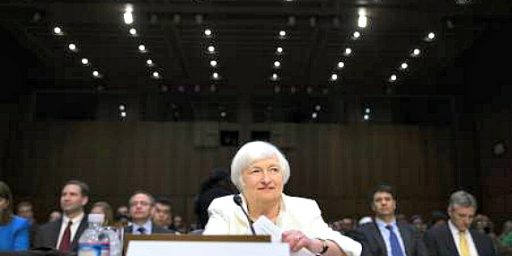Federal Reserve Board Declines To Raise Interest Rates Again
An unsurprising decision from the Federal Reserve.
Once again, the Federal Reserve Board has decided to forego raising interest rates:
WASHINGTON — A divided Federal Reserve left its benchmark interest rate unchanged on Wednesday, pressing ahead with its economic stimulus campaign for at least a few more weeks in the face of growing pressure to raise rates.
Janet L. Yellen, the Fed’s chairwoman, said a majority of Fed officials simply did not see a reason to pull back. Low interest rates are still aiding the economic recovery and are not causing the economy to grow too fast.
“We’re generally pleased with how the economy is doing,” Ms. Yellen said at a news conference after the Fed’s announcement. “The economy has a little more room to run than might have previously been thought. That’s good news.”
But three members of the Fed’s 10-member policy-making committee voted to raise the benchmark rate, the largest number of dissents since December 2014. That reflects growing concern that the Fed is waiting too long to raise rates.
In a new round of economic projections published on Wednesday, 14 of 17 Fed officials said they expected to raise the benchmark rate at least once this year. The Fed’s next scheduled meeting is in November, six days before the presidential election, and another will be held in mid-December. Many analysts and investors expect the Fed to wait until at least December before acting.
The Fed said in a statement that reflected the views of the majority that economic conditions were improving.
“The growth of economic activity has picked up from the modest pace seen in the first half of the year,” it said. But the statement said that inflation remained slower than the Fed’s desired pace, adding, “Near-term risks to the economic outlook appear roughly balanced.”
Ms. Yellen said differences among Fed officials were easy to overstate. Board members agreed that continued growth would warrant a rate increase.
“Our decision does not reflect a lack of confidence in the economy,” she said.
Most officials simply wanted to wait a little longer before moving.
“The committee judges that the case for an increase in the federal funds rate has strengthened but decided, for the time being, to wait for further evidence of continued progress toward its objectives,” the Fed said in the statement.
The three dissidents, all of whom voted in favor of raising interest rates by a quarter-point in September, were Esther L. George, president of the Federal Reserve Bank of Kansas City; Loretta J. Mester, president of the Federal Reserve Bank of Cleveland; and Eric S. Rosengren, president of the Federal Reserve Bank of Boston. The statement did not explain their votes, but in recent weeks the three officials all said publicly that they saw growing risks in waiting.
The last time three Fed officials dissented from a policy decision was nearly two years ago, when a bloc of reserve bank presidents wanted Ms. Yellen to move more quickly to tighten policy.
The Fed is not only hesitating to raise rates this year; it also predicted that it would raise rates more slowly in future years. Fed officials estimated the central bank’s benchmark rate would rise to 1.9 percent by the end of 2018, well below their prediction last September that the rate would reach 3.4 percent by 2018.
They continued to settle into a new view that growth would remain sluggish for the foreseeable future. Fed officials said they expected that economic growth would not exceed 2 percent over the next three years. They predicted that the unemployment rate would continue to fall a little, touching bottom at 4.5 percent in 2018, while inflation would rise to 2 percent by 2018 and stabilize at that level.
(emphasis mine)
Given recent economic news, it’s not surprising that the Fed is continuing to hold off on raising interest rates. Economic growth as measured by Gross Domestic Product remains sluggish at best and forecasts for the coming year suggest that we can look forward to more of the same in the coming year. The remainder of the third quarter, as well as the fourth quarter, aren’t likely to be a time for the economy since many businesses are likely to be sitting on the sidelines awaiting the results of the Presidential election and some indication of what kind of policies can be expected out of whomever the 45th President of the United States will be before making any major decision are made. Given that both candidates are at least talking about the idea of major changes to tax laws, for example, it would be rather foolish for a business owner to make any major decision before having some indication of how it might be impacted by future policy. The jobs market isn’t much better, with less than 200,000 new jobs being created per month since the start of 2016, far below to completely deal with either the people still looking for viable full-time employment after falling victim to the Great Recession and the new people entering the workforce each month. Furthermore, the fact that we’re in the middle of a Presidential election makes it unlikely that the Fed will take any action until there’s some clue as to which direction future fiscal policy may go. Finally, the fact of the matter is that there simply isn’t any evidence of the kind of inflation or runaway economic growth that would make Federal Reserve action either presently or in the near future necessary suggests that the Fed shouldn’t act at the present time.
Unfortunately, as the statement released in conjunction with today’s decision would seem to make clear, the board is determined to raise rates at least once this year, the only question is a matter of when it will happen. Given that the next board meeting occurs less than a week prior to the election, it’s unlikely that they’ll do anything in November, so that suggests that, as we saw last year, the Board of Governors will use its December meeting to increase rates yet again. Like last time, this will likely be a modest, almost undetectable, increase that probably won’t have much of a noticeable impact for most people. Eventually though, these decisions will start having a real impact and the question will be whether the economy is strong enough to withstand the impact of the decision.






awesome, our economy is still on fed mandated life support, the banks get virtually free money to make more money on and joe avg. can’t open an interest bearing bank account anymore as their tax dollars are supporting the banks that are burying them…..or am i wrong? that the banks/wall st wised up and paid off the democrats was good for them, bad for us.
but hey, that’s just me i guess!
now tell me more about how wonderful obama has done the past 8 yrs – i’ll pop some corn.
They’re skeptical of the employment and income number reports and don’t want to get blamed if things go pear-shaped.
@bill:
Here’s a hint, bill. You cannot have 1/3 of your economy (federal, state, and local governments) remain stagnant and expect significant growth.
Your party is waging war on the middle class on a bunch of fronts, but a big one is Government austerity. During times of slack demand it is incumbent upon the Government to grow. Every President in modern times has grown the Government to get out of a recession. Today’s Republican Party has not allowed that to happen.
http://economistsview.typepad.com/economistsview/2013/02/per-capita-government-spending-by-president.html
You want smaller Government…you got it. Ipso Facto we have the economy Republicans want. So why exactly are you complaining? Because the Republican Establishment has you duped, and you don’t know any better? That would be my guess.
@Dave Schuler:
Agreed, but they are still signaling for a rate hike this year. Based on all available evidence that makes no sense.
Some of the sources I had looked at felt sure that there would be a small increase, so I am surprised. And look at the German bank repayment flap with the US: Department of Justice demands repayment of $14 billion loan from Germany. Bank officials there say they don’t have any where near that kind of money and things could get bad. Is that why the German chancellor told the people to start stocking up food and water ?
Last night I saw Senator Warren jumping all over some bank official worse than Blalock’s bull. What was that about ?
The small banks are complaining of all these heavy regulations that are hurting them ! Please, let’s not throw out the baby with the bath water ! Senator Warren needs to realize that many of us like our local, small bank. Around here they know us by name. So let’s not mess that up. And they have free coffee and donuts ! What about that, Senator Warren ? Not all banks are bad.
@Tyrell: Tyrell, Sen. Warren did not attack your small, local bank. She attacked the chair of WellsFargo, one of those megabanks that is actually harming your small, local bank. WellsFargo has opened a bunch of accounts in the names of its customers without the consent or knowledge of those customers. We could get rid of those bothersome federal bank regulations if the giant national banks stopped trying to rip people off.
@Tyrell: Warren jumped all over the CEO of Wells Fargo and if you follow the news at all it’s hard to believe you don’t know why.
She’s also having fun with Comey at the FBI. The FBI doesn’t comment on investigations that don’t lead to indictment. Comey broke that precedent so he could editorialize on Clinton’s emails. Since the precedent is broken, Warren wants to know what happened with nine named bank executives that the commission investigating the ’08 crisis recommended to the FBI be investigated for criminal actions leading to the collapse. I’d like to know too.
@Tyrell: Oh, and since the banksters collectively blew up the economy in ’08 and none of them have been held to account, the plight of your small bankers, besides being largely BS, deserves another round of the world’s tiniest violin. Listen closely to your monitor and you might hear it.
@Slugger:
No. If there is one thing economic history teaches, it is that if you do not heavily and effectively regulate banks they WILL over-leverage. I highly recommend an oldie but a goody by John Galbraith that stands up well (and is screamingly funny), and the movie “Stagecoach”. You may remember the banker desperate to continue on the stage, bitching about the bank examiner and clutching his valise.
IIRC Krugman, who has been staunchly opposing tightening, did a column recently saying that well, maybe it’d be OK now. I’m seeing help wanted signs all over the place. A headhunter called me while I was still in bed this morning. (OK, I’m retired, it wasn’t that early.) Next thing you know, employers will have to be offering more money. Oh noes! Heck, we might reach the point the Fed actually meets an inflation target.
@Doug Mataconis:
It’s like Augustine’s prayer: “Grant me chastity and continence but not yet.” Return interest rates to historic levels—but not yet.
@gVOR08: Thanks for that reply. I caught a clip of Senator Warren on the local news last night and I have not seen the whole story on this.
The bank picture might be worse than is thought. See “Coming Economic Collapse” (project clarity) . Might be a lot of conjecture, but is interesting.
Yes, of course, because Republicans have nothing to do with Wall Street…
Uh huh, because we were just so much better off before he won the presidency…
As Clavin wrote, in previous downturns the government pumped money into the economy but thanks to your Republican overlords we can’t do that this time…
Add all of this up and it shows that you are full of it and should stick to claiming how color-blind you are when it comes to racial matters…at least that’s good for a laugh…
@Doug Mataconis: There won’t be a December rate rise.
@C. Clavin: X-Men which is more frightening. That you actually believe this stuff or that you just making out that you do
@C. Clavin: X-Men which is more frightening. That you actually believe this stuff or that you just making out that you do
@gVOR08: what year apparently missing is that the bankers were doing precisely what the government wanted them to do
@Eric Florack: Governments go along with what bankers want done.
@Eric Florack:
Right…While I present an argument and stats to back it up…you just have comic books and emotions…you fwcking ignorant racist fool.
All…search Floracks website for the “N” word and see how many entries you get.
http://bitsblog.theconservativereader.com/
Hint…it’s a lot.
@Doug Mataconis:
Wall Street wants a rate hike, so it’s on the table.
From CNN Money from last year:
this is from Time, last spring:
so in short, it would be bad for workers, and bad for borrowers, and bad for the economy, but good for bank profits, and government responds to the needs of the rich.
@Thor thormussen: Then you have the WSJ, which will have an article ranting about how raising the interests is All Wrong and Will Do Horrible Things To Business, right across from another article whining about how the Low Interest Rates Are Clobbering Retirees.
(Make up your minds, for sod’s sake. Do you guys want higher interest rates or not?)
The WSJ is often conflicted. I’ve seen some really good WSJ writers publicly apologize for the WSJ editorial page.
@C. Clavin: wow, you should be an economics professor or something……but really not.
as usual, all bad things lead back to the gop for whatever reason.
i kinda look at it like hey don’t want to make a black prez look worse than he is- but maybe that’s just me. i don’t think the gop wants a nation reliant on the gov’t. , au contraire!
i do recall his threat to the black community the other day- how they best not mess with his “legacy”.
maybe he didn’t realize his “legacy” with the black community has actually dropped their wages, increased their level of poverty and kept their unemployment way higher than whites- and i don’t need to go into the “foodstamp nation” thing again, do i?
but he didn’t say anything about behaving like humans when you’re upset about crime…….typical though-blame whitey for your failures.
@bill: Did you happen to notice what was happening to the economy when Obama was elected POTUS? The crashing of the economy? What was going on with the stock market? The ever increasing unemployment?
Worse my foot.
@bill:
I notice that you refuse to address my argument…and merely type your typical nonsensical blather.
You Republicans are so invested in your emotions these days.
The basis of interest rate policy is found in the Phillips Curve: http://www.investopedia.com/terms/p/phillipscurve.asp Central banking is a balancing act between job creation and inflation management.
Under normal circumstances, one would have expected the Fed to raise rates because the economy is near full employment, which combined with low rates should contribute to inflation.
But issues abroad (Brexit risk/ uncertainty, Chinese recession) understandably create some nervousness within the Fed, and those are issues beyond the US’ control.
The Fed can’t say it publicly, but there may also be some concerns about a Trump election win.
http://www.marketplace.org/2016/09/19/world/wall-street-economists-trump-presidency-could-trigger-recession
As was the case for Britain with Brexit for UK markets and the sterling, a Trump win could be bad for US markets and the dollar. If Trump wins, don’t be surprised if the Fed starts preparing for another round of quantitative easing.
@Thor thormussen: I like the WSJ precisely because the Editorial page is separated from the news, so, I just don´t need to read all that crap. In the FT and in the Economist the Editorial Crap is mixed with the news articles.
OT, but really super insightful about how the GOP got where it is. Interview w Sam Goldman